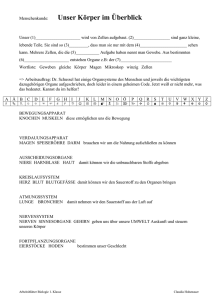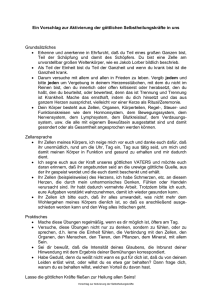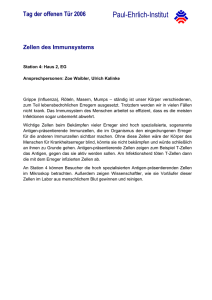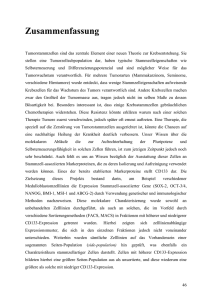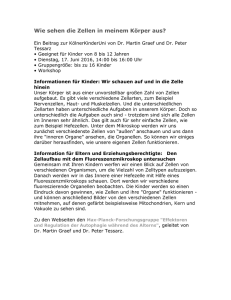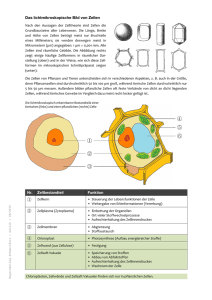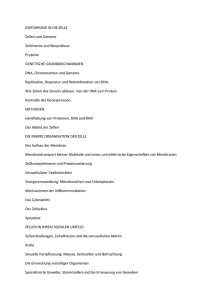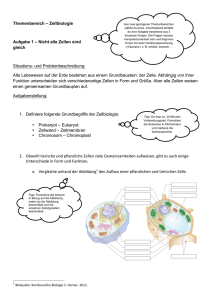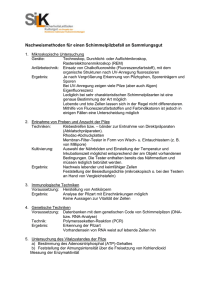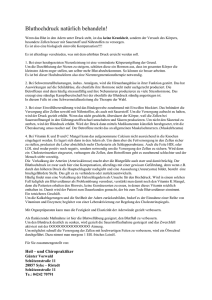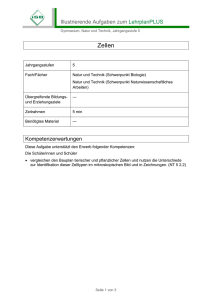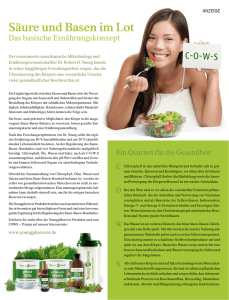Contest - Proteomanalyse von 10.000 Zellen
Werbung
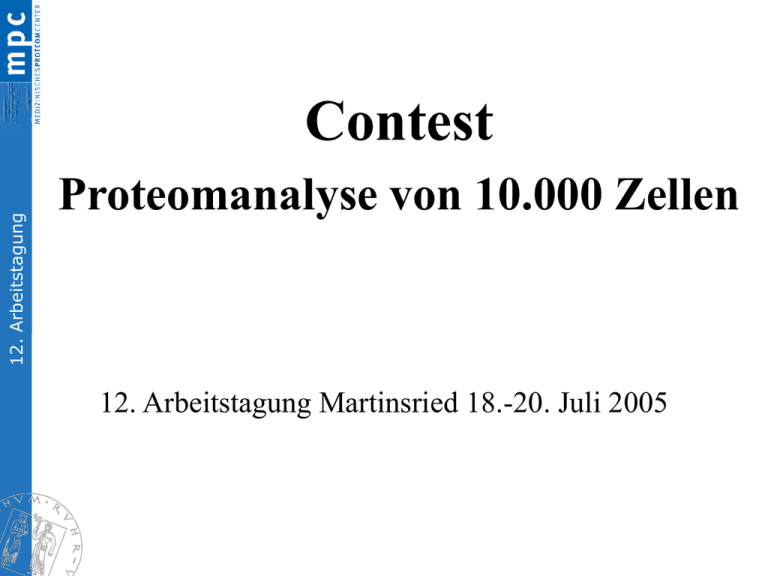
12. Arbeitstagung Contest Proteomanalyse von 10.000 Zellen 12. Arbeitstagung Martinsried 18.-20. Juli 2005 12. Arbeitstagung Analyse eines Zellpellets aus 10.000 Zellen • Menschliche Zellinie aus embryonalen Nierengewebe • HEK 293 Zellen wurden unter Standardbedingungen kultiviert. • Zellen wurden bei 4°C geerntet und 3 mal mit PBSPuffer gewaschen • Zellen wurden gezählt und mit PBS-Puffer auf eine Konzentration von 10.000 Zellen pro 10 µl eingestellt. • Zellen wurden aliquotiert und in der SpeedVac eingeengt. 12. Arbeitstagung Reproduzierbarkeit der Aliquotierung der Pellets von 10.000 Zellen • Reproduzierbarkeit der Erzeugung der Zellpellets wurde mittels SDS-PAGE überprüft 1 2 3 4 5 6 7 1 Marker 2-7 Pellets von 10.000 Zellen Optimierung der Verdaubedingungen Bedingungen: A B C D E -+ -+ -+ -+ -+ 12. Arbeitstagung • Für die Optimierung des Verdaus wurden verschiedene Bedingungen getestet • Ansätze wurden mittels SDSPAGE verglichen Marker A Phosphat-Puffer/CHAPS/Ultraschall/Benzonase -/+ Trypsin B Phosphat-Puffer/CHAPS/Ultraschall -/+Trypsin C Phosphat-Puffer /CHAPS/95°C/Benzonase -/+ Trypsin D Phosphat-Puffer/CHAPS/ 95° -/+Trypsin E 1 M Harnstoff-Puffer/CHAPS -/+ Trypsin 12. Arbeitstagung Herstellung des Verdaus von 10.000 Zellen • Ausgangsmaterial: Zellpellet aus 2 Millionen Zellen • In 20 µl Lysis-Puffer (TrisHCl 30 mM; Thioharnstoff 2M; Harnstoff 7 M; CHAPS 4 %) aufgenommen • 6 x 10 Sekunden Ultraschall lysiert • 1:10 verdünnt mit 10 mM NH4HCO3-Puffer • 100 µl Trypsinlösung (0,06 µg/µl) zugegeben • Inkubation über Nacht • Volumen auf 2 ml gebracht (Wasser) • In 10 µl Aliquots aufgeteilt; entsprechend 10.000 Zellen • Aliquots in der SpeedVac eingeengt Reproduzierbarkeit der einzelnen Contest-Aliquots RT: 0.00 - 65.04 100 95 90 90 85 85 80 80 75 61.06 989.6 75 70 70 65 65 Relative Abundance Relative Abundance 95 60 63.16 989.6 55 50 45 40 43.73 41.42 640.7 45.34 914.5 50.13 688.5 831.6 33.78 816.5 35 30 60 55 45 15 26.00 22.58 981.5 16.77 19.51 901.7 1003.6 594.6 10 5 1.69 7.25 1015.6 1577.5 0 0 5 10 15 20 25 31.81 816.5 40 49.30 912.6 30 25 20 31.25 1168.4 15 22.78 17.82 981.6 3.87 7.89 15.53 901.6 819.4 615.4 1003.6 10 5 30 35 Time (min) 40 45 50 39.85 43.40 715.6 914.4 35 39.70 844.5 20 48.22 831.6 50 55.10 1180.6 25 55 0 60 0 5 10 15 20 29.06 26.17 1168.5 712.5 25 58.16 1314.5 37.76 844.5 30 35 Time (min) 40 45 50 55 60 65 RT: 0.00 - 65.07 NL: 60.28 7.07E7 953.6 Base Peak 60.40 MS 953.6 LCQ11139 100 95 90 95 NL: 6.65E7 Base Peak MS LCQ11140 90 85 80 85 75 80 48.11 831.6 70 75 65 70 65 60 49.94 831.6 55 50 45 33.56 816.5 40 35 62.92 989.6 Relative Abundance LCQ classic Säule: C18; Ø 75 µm x 25 cm Gradient Ameisensäure, 90 min 58.33 953.6 100 RT: 0.00 - 65.07 Relative Abundance 12. Arbeitstagung 100 BasepeakChromatogramme von vier Contest-Verdau Proben NL: 7.23E7 Base Peak MS LCQ11137 60.60 953.6 NL: 6.52E7 Base Peak MS LCQ11138 58.50 953.6 RT: 0.00 - 64.99 41.39 42.00 715.6 850.4 55 50 31.69 816.5 45 54.76 977.9 35 43.70 664.0 30 50.91 1161.4 30 40.90 688.6 25 25 15 10 15.35 19.24 831.6 1003.5 3.34 7.47 860.1 615.4 5 0 0 5 10 15 28.92 1168.5 25.87 712.5 20 30.80 1168.4 20 15 25.79 22.18 981.5 901.6 10 17.02 17.80 13.26 943.6 901.7 594.5 0.83 948.7 5 0 20 25 30 35 Time (min) 40 45 50 55 54.88 978.1 43.33 39.32 914.4 688.5 40 56.85 977.8 41.03 688.5 60 65 61.03 989.6 60 0 5 10 15 20 32.17 1134.4 22.51 981.4 25 30 35 Time (min) 40 45 50 55 60 65 12. Arbeitstagung 2D-PAGE von 10.000 Zellen, 2 µg Protein, Cy3-markiert (40 cm x 30 cm) 3.100 Proteinspots Contest-Teilnehmer Verdau 12. Arbeitstagung Methode Pellet Methode Agilent Technologies 3 Läufe 1D-LC-MS/MS (HPLC-Chip/MS XCT Ultra) Applied Biosystems 2 Läufe LC MALDI – MS/MS (4800 TOF/TOF Analyzer) 1 Lauf LC-MS/MS (MIDAS; 4000QTRAP) Bruker Daltonics 1 Lauf LC-ESI-IT MS (HCT) 1 Lauf LC-MALDIMS/MS (Ultraflex) GE Healthcare 3 Läufe 1D-LC-MS/MS (LTQ) 3 Läufe 2D-LCMS/MS (LTQ) Protana Inc. 3 Läufe LC-MS/MS ( LTQ, "Proteome Reactor“) Thermo Electron 3 Läufe LC-MS/MS (LTQ) Methode 2 Läufe LCMALDI-MS/MS (Ultraflex) 3 Läufe LCMS/MS ( LTQ, "Proteome Reactor“) Suchmaschine Datenbank Spectrum Mill (A03.01.03 7a) IPI.human.v 306 MASCOT CDS MASCOT (v2.1.0) Swissprot (21.06.2005) Sequest NCBI MASCOT (v2.1.0) NCBI (June 2005) Turbo-Sequest v27 (rev.13) NCBI (Mai 2005) 12. Arbeitstagung Übereinstimmung (Homologiecluster) der identifizierten Proteine zwischen den Contest-Teilnehmer Insgesamt 1757 nicht-homologe Sequenzen 52 +64 +110 6fach 3% 5fach 4% 4fach 6% +171 3fach 10% +251 1109 1fach 63% 2fach 14% Nature Methods Vol. 2,9, Sept. 2005, 647-48 12. Arbeitstagung How to deal with data & results performing high-throughput proteomics Experiments – irrespective of their size and effort and of the amount of the acquired data - have to be repeated independently several times to demonstrate their reproducibilty to get significant results This will remove most of the „1hit wonders“ One-time experiments can not elucidate quantitative differences in two different proteomes, therefore, they should not be named quantitative! We have to go back to scientifically sound experimental work & strategies to create value(s) for ourself and for the society who gives us the money and deserves that we do our best. 12. Arbeitstagung Danksagung Anja Tatzel - Biochemiestudentin Christian Stephan - Bioinformatik Christian Scheer –Protagen, Bioinformatik Christian Bunse – LC-MS/MS Oliver von End – Nierenzellen Kai Stühler
